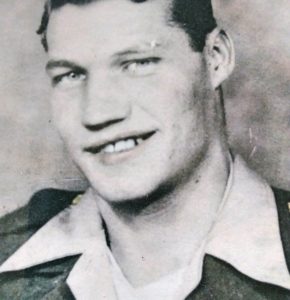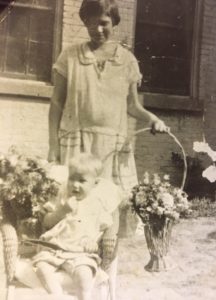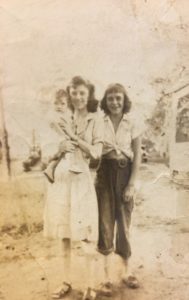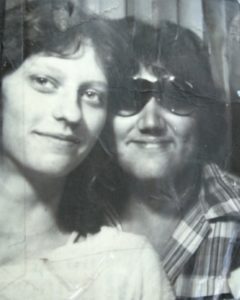I am from the muddy brown waters of the Muskingum River. It is a place I cannot hide from the truth of myself – where lies burn away like sins on an altar. I am both pulled to and pushed away from its borders. The small Appalachian town raised me as much as any person did – influenced by the smell and swell of foam spewing from sewer tunnels.

My dad was born and raised next to that river, interrupted only by the jobs his father, Fred, lined up. Ohio to Florida. Maintenance man to an upholsterer. Fred Pride was never without work because work defined him as much as his broad nose and crooked smile. His eight children were a rough and tumble crew ready to throw fists to uphold their honor. They were often dirty-faced and bloody lipped but never went hungry – at least not for too long. Nearly everyone in Zanesville at that time had a growling stomach and dirty knuckles. My dad likes to talk about the year his dad made “good money” and was able to buy him a razor, socks, and a comb for Christmas.
Fred served two tours in the United States Army during World War II, stationed in the Philippines. We all knew he killed some men, but he didn’t talk about it much. He was released from duty in July 1949. His father, John Henry, died in November that same year.
John Henry was best known for his drinking and affinity for young women. He looks like a genial and good-natured sort of man in the only picture I have ever seen of him. It in, he has on a wide-brimmed hat that sits at an angle atop his head. He wears dark wool trousers, a long coat, and a tie loosened at the collar. A girl around the age of 7 or 8 is standing beside him. He is smiling. She is not.

No one knows the name of his first wife, but his second was named Blanche. She and John Henry had two daughters: Minnie, born in 1902, and Leanna Pearl, born in 1913. Minnie was blind. I do not know if she was born blind or lost her sight in childhood. A newspaper article dated July 13, 1915 notes that she was attacked by a neighbor. The article states that Frank Barlow, a neighbor, broke in while the girl was home alone. Minnie, listed as being 15 years old rather than her actual age of 11, was found Monday morning when, “her mother returned.” It does not say what happened to Minnie, Frank Barlow, or where her mother was. Three years later, Minnie died of Tuberculous. Her sister Leanna died in 1920 of Scarlet Fever. Shortly after the death of both girls, John Henry and Blanche divorced. He remarried in 1925 and went on to father four more children, my grandfather, Fred, the oldest. John Henry rarely spoke of Minnie or Leanna.
My grandfather, Fred, didn’t talk much about his dad, only telling his children a few stories and none of them were good. John Henry drank at a time when that is what men did. He beat his kids and probably his wives and ran around with prostitutes all over Muskingum County. It is said he used to beat Fred bloody then send him downtown to peddle a fruit cart. He would take the money his son earned and buy booze, then come home stinking of women and liquor.
John Henry’s drunken exploits were legendary around Zanesville. In 1914, he was convicted of keeping a place that sold intoxicating liquor and fined $100. In 1940, he was charged with assault, when he and another man got drunk and pummeled each other. Family legend says he died of alcohol poisoning, dying right outside the town’s brothel. Stories like that get passed down in Appalachian families. You never know if they are true, but I figure every tall tale has a little truth in it.
I don’t know why my grandfather named my dad after his father, a man he never said a kind word about. Maybe Fred took one look at my dad and knew this John, his John, would be different. Maybe he knew this John would be gentle and kind, or maybe by the time my dad came along in 1962, Fred had a more forgiving view of his father. Children have a way of growing up and realizing they’re more like their parents than they’d like to be. Maybe by 1962, after having four kids of his own and his father’s taste for alcohol, Fred saw the name John differently.
And my dad was gentle. He heard Fred yell and cuss so much as a kid he was too weary to raise his own the same way, or maybe he just knew the yelling would come from somewhere, and so it needn’t come from him.
Dad was the least rowdy of the Pride siblings, often stepping behind his older sister, Diane, when boys saddled up ready to fight the blonde-haired, green-eyed boy that was too pretty for his own good. Dad wasn’t a coward; he just figured there were some things not worth fighting for. He got into his share of scraps, but Diane was tough as nails and would break the nose of anybody, boy or girl, who dared look sideways at her or her family. She learned to fight at the feet of her dad and learned loyalty at the knees of her mother.

My grandma, Norma Jean “Jeannie” Talbert Pride was a West Virginia coal miner’s daughter. All my life they called her a praying woman. A prayer warrior. She could shout down angels from heaven right along with her bobby pins, letting the Spirit and her hair flow. She would lay hands on you, speak in tongues, and you’d feel a chill go up your spine, and you believed, if only for a moment, that you could be saved by the touch of her hands. Life had been hard on her, and the man she loved enough to marry at 16 years old hadn’t made it any easier, but she was the sweetest woman I’ve ever known. I think maybe Jesus really did live in her.
She outlived Fred and was a widow for the first time at 63 years old. Fred died from a heart attack at the age of 67. By the time Grandma died in 2018, at the age of 88, she had outlived three husbands and two children. At the end, nearly every day she would say her momma came to visit her. I like to think her mother came that day and ushered her into heaven.
My grandma’s casket was white and glittered like a diamond on the sunny April day when we laid her to rest. Red roses laid atop it, and her surviving children stood next to one another crying as a recording of her voice, cracked with age, sang Amazing Grace. I picture her standing in front of a little wooden pew with her eyes closed and her hands raised.
If working and drinking defined a man, churches defined the region. Pentecostal churches planted themselves in towns where the people needed saving. Everything from alcohol to gambling to outright meanness was afflictions the Holy Ghost could cure. The women shuffled around town in their long dresses and waist-length hair, praying in tongues and asking God to save their families. They knew even if things were hard for a while, their reward was waiting over yonder. They dreamt of mansions and streets of gold.
The Pentecostals were known for their shouting and dancing. For their fire and brimstone preachers. For their sweat laden foreheads and Bible thumping fists. The Prides were never preachers. We never had enough dedication for something like that. No, the Prides went to church on Sunday and needed saving again by Wednesday afternoon.
Our churches sang about the blood of Jesus and dining tables set for His bride. We took communion with such fierceness that you repented for every sin you could remember having committed before letting the grape juice color your lips. We broke His body, letting the wafer touch our tongues. We held our breath.
I liked to watch the preachers. I liked their red faces and highlighted bibles. My mom bought my dad a large print King James bible for Christmas one year. It was a beautiful thing. The blood-red leather and gold stitched cover looked like something a real man of God would use and seeing it in my dad’s hands made me feel like everything would be alright. It would lay open beside him sometimes while he played the guitar, producing a sound so sweet I wondered if all of his soul was being poured out into those strings. I begged him to teach me to play, but he would shake his head and tell me he wasn’t good enough to teach anyone. But I would listen to him strumming along with B.B. King and Muddy Waters, and I couldn’t tell where their notes ended and his began. I suppose the blues is just something he came to be, and then it flowed out of him with no special teaching required. He could’ve taught me but didn’t. I think it was shame mostly. He stopped his formal education before high school started and never felt he could teach anyone anything. When he had to write a letter, he asked my mom how to spell the bigger words he never learned or forgot along the way.

One of my favorite hymns isn’t bluesy or particularly soulful, but it makes my eyes burn when I hear it. I’ll cherish the old, rugged cross. Till my trophies, at last, I lay down. And I’ll cling to the old, rugged cross and exchange it someday for a crown. My dad would sing it softly in his baritone voice, and sometimes I would spot tears on his cheeks.
But nothing moved him like hearing my mom sing an old gospel song called, The Lighthouse. Her voice, sweet and high, could make the words float like they were caught by the breeze. She would sing and close her eyes, and my dad would cry like it was the first time he ever heard it. Mom’s voice could bring a congregation to their knees, and Dad would look at her like she was a lighthouse personified.
Mom would sit next to Dad in our living room while he played the guitar and sing along. I don’t know if I will ever see them any other way. Mom with thick brown hair and glasses too large for her thin face, and Dad with a guitar on his knee, eyes closed against the force of a melody. In my mind, they are frozen in time, together and in love, singing songs about lost souls and promised treasures in our falling down house.
I never did learn to play guitar, but there is a delicious kind of warmth that spreads through me when I hear Muddy Waters. It shuts my eyes and sways my head and calls me home.
April Sharp is a graduate of the Northeast Ohio Master of Fine Arts program. She often writes of her childhood growing up in Southeast Ohio. She now resided in Akron, Ohio, with her husband and two sons. Her work has been featured in The Devil Strip and Rubbertop Review. When not writing, April can be found stomping through the woods with her dogs, Socks and Canon.
**Featured Image by Bridget H. on flickr, July 10, 2008, altered black & white
***All photographs of the Pride family are courtesy of April Sharp’s collection
